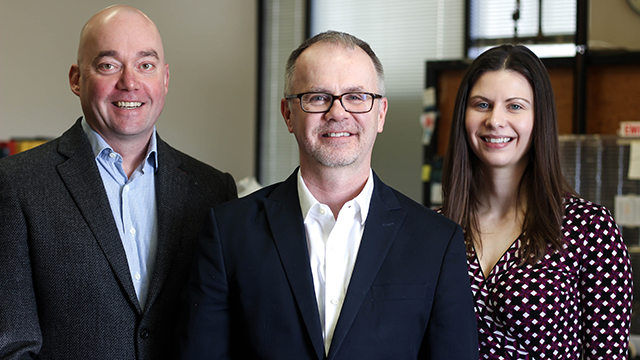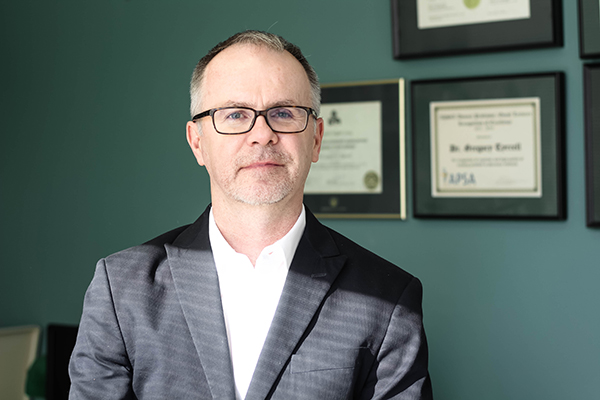
Clinical microbiologists Steven Drews, Gregory Tyrrell and Carmen Charlton
Tracing infectious diseases back to the tiny, unseen organisms that cause them takes innovative technology paired with the expertise of the brightest microbiologists. Enter Gregory Tyrrell, clinical microbiologist and professor at the Faculty of Medicine & Dentistry's Department of Laboratory Medicine and Pathology, and his research team, recipients of the John R. Evans Leaders Fund (JELF) by the Canadian Innovation Fund.
The recent $178,907 JELF investment to Tyrrell, Carmen Charlton and Steven Drews will provide the team with the resources to create a new Infectious Diseases Research Centre at the U of A.
"The infrastructure from JELF will allow us to obtain equipment to rapidly respond to outbreaks. We will have equipment for genomics and genome sequencing--for example, to understand why an infection spreads so rapidly from one single case," says Tyrrell.
The lab's state-of-the-art technology will facilitate the development of the three researchers' critical projects. Tyrrell will focus on Group B streptococcal (GBS) pathogenesis. "These are bacteria that a baby can acquire during birth if there is inhalation of contaminated amniotic fluid, moving from the lungs to the bloodstream, into the brain, and has the potential to cause devastating disease if left unchecked."
Tyrrell says there have been cases of GBS meningitis at the University of Alberta Hospital and explains there are no vaccines for these bacteria. "I'm trying to understand how the bacteria invade and studying two proteins we have identified that may have potential for vaccines."
Drews will study the effects of new strains of influenza that appear in Alberta and Canada, and what health issues may result beyond respiratory disease. "We can better understand atypical influenza," says Tyrrell. "Patients with atypical influenza infections can be much sicker than those with typical influenza. We can help patients understand their symptoms and why they are so sick."
Charlton's area of focus is the immunity to the rubella virus, focused on prenatal infections and protection. "That's a big issue in Canada now," adds Tyrrell. "A significant percentage of women in this country don't have measurable rubella antibodies, even though they were vaccinated. So, are they protected? These are the questions we are trying to answer."
Currently, only the Provincial Laboratory for Public Health (ProvLab)-operated under Alberta Health Services (AHS) Laboratory Services and based out of two sites, the Foothills Medical Centre in Calgary, and the University of Alberta Hospital in Edmonton-handles public health diagnostics in Alberta. Even though ProvLab is one of the biggest in Canada, the demand is high and there is limited access to the advanced equipment necessary for genomic sequencing.
Tyrrell and his team look forward to building their laboratory for infectious diseases as a much needed additional option.
Prevention is in our hands, literally
Most infectious diseases are controlled to the point where many of us think they have been finally eradicated, but the diseases eventually reappear. Why do people keep getting sick? Tyrrell says the answer lies literally at our fingertips, reminding of the importance of good hygiene habits to avoid spreading diseases-washing hands frequently and staying home when sick. He emphatically insists that everyone should be vaccinated, even for those diseases that seem to be long gone.
"These bacteria and organisms are always a threat," says Tyrrell. "Recently we had one case of diphtheria in Southern Alberta. Nobody thinks of diphtheria anymore, and thousands of vaccines have been administered globally. We suspect in this one case the patient had missed the vaccination. The reality is that diphtheria is always around. And that just provides an example that if we don't receive our vaccinations, diseases will return."
Meet our partners in innovation
The Canada Foundation for Innovation (CFI) was created in 1997 with the purpose of providing Canadian researchers with the tools and technology needed to advance in their search for discovery in all disciplines.
The John R. Evans Leaders Fund is an initiative in honour to the CFI's first Board Chair and his contributions. The JELF grants are awarded to outstanding researchers that promote groundbreaking research and demonstrate leadership in their field.